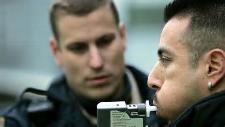 Were you arrested for DUI in Bakersfield after failing or refusing a breath or blood test? If so, Bakersfield DUI lawyer H.A. Sala can present an aggressive and effective defense.
Were you arrested for DUI in Bakersfield after failing or refusing a breath or blood test? If so, Bakersfield DUI lawyer H.A. Sala can present an aggressive and effective defense.
To secure a conviction for DUI (driving under the influence), the prosecutor must rely on the results of a driver's breath or blood test. A breath or blood test is used to determine a driver's blood alcohol concentration (BAC), which is the level of alcohol in his/her system. If a driver is operating a motor vehicle with a blood alcohol concentration of .08% or greater, he/she may be charged with DUI, and also may be subject to a license suspension by the Department of Motor Vehicles. If you are arrested and charged with driving with a blood alcohol concentration of .08% or greater, it is important you contact the DMV and request a hearing within 10 days of your arrest or your license shall be suspended.
It is unlawful for drivers under the age of 21 years old to drive a motor vehicle with a BAC of .01% or greater.
It is unlawful for any person to drive a commercial vehicle with a BAC of .04% or greater.
About Breath Tests
A breath test is typically administered by having a driver blow into a device which analyzes a breath sample and determines the concentration of alcohol. Breath tests are commonly considered less reliable than blood tests and may have a number of issues that can affect the result. H.A. Sala can challenge the reliability of the breath test result. For example, the machine must be calibrated frequently and according to state standards for the results to be considered reliable. If the device was not calibrated properly, H.A. Sala can use this to your advantage in a criminal prosecution.
About Blood Tests
A blood test is conducted by taking a blood sample to determine the driver’s blood alcohol concentration. Although more accurate than breath tests, blood tests have their faults. For example, the manufacturer of the blood collection tube requires that the tube be inverted 180 degrees for 10 times. Each tube is a vacuum design to draw 9.3 to 10.7 ml of blood. These procedures are important to ensure that the proper ratio of potassium oxalate (anti-coagulant) and sodium fluoride (preservative) are maintained within the tube. Failure to follow proper protocol may affect the reliability and accuracy of the blood alcohol concentration. H.A. Sala will investigate whether the proper protocol and procedures were followed in your case and if they were not, he will use that to effectively advance your defense. Find out more about breath and blood tests and DUI by contacting H.A. Sala today.

